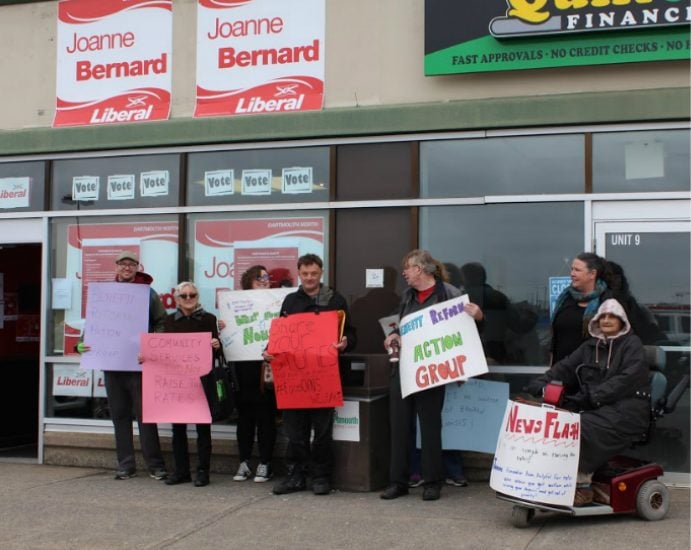KJIPUKTUK (Halifax) – People living in poverty don’t count, and that’s the way political parties once in power like it. Kelly Regan, the newly appointed minister of Community Services, isn’t going to change that.
This is not a rant, by the way. It’s a trend.

Single persons with disabilities in Nova Scotia saw their welfare incomes in real terms drop continually from $12,824 in 1989 to $9,908 in 2013. That’s 23 years, nine governments and a steady decline in buying power for Nova Scotia’s poorest each and every year.
Nine governments, and not a single one that made an effort to turn things around. Now we have a government that both loves austerity and wants to “transform the way welfare is delivered,” a combination that has lead to disaster in other jurisdictions.
So who is coming to the rescue?
There is a school of thought among anti-poverty advocates that holds that things like lobbying ministers and senior bureaucrats can create real change. This is of course well intentioned, and even useful in a limited fashion. But by and large these advocates are being managed and used to so the department can claim it is listening, while what they say goes in one ear and out the other.
All too often these same advocates belong to organizations that depend on Community Services for grants, which often (not always) further limits their ability to speak out.
Relying on supportive politicians would be equally mistaken. I have been sitting in on Community Services standing committee meetings for six years now, and believe me, it’s an incredibly tame bunch. And anyways, there is very little they can do when faced with a majority government.
People on income assistance will need to start taking their fate in their own hands. Politicians love a well-managed stakeholder meeting, but they hate a noisy bunch of welfare recipients in front of their constituency office, especially when the media shows up.
And they hate to lose elections.
Former Community Services minister Joanne Bernard, running in a low income constituency, got soundly beaten. No doubt healthcare and local issues played a role in her defeat. But only two ministers lost the election, and she was one of them. In a low turnout election it doesn’t take a whole lot of angry welfare recipients to send a politician on his or her way.
Time to get loud.
If you can, please support the Nova Scotia Advocate so that it can continue to cover issues such as poverty, racism, exclusion, workers’ rights and the environment in Nova Scotia. A pay wall is not an option since it would exclude many readers who don’t have any disposable income at all. We rely entirely on one-time donations and a tiny but mighty group of kindhearted monthly sustainers.



